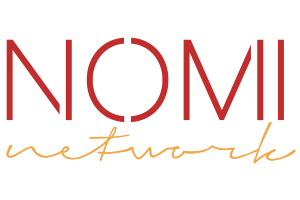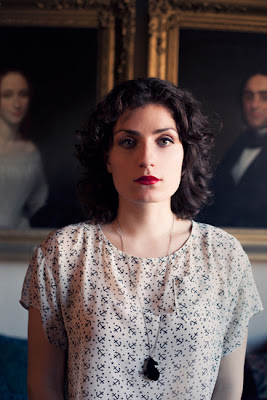15 Minutes with Esosa Edosomwan
What makes Nomi Network truly innovative and daring in its abolitionist vision is its desire to leverage film, fashion, music and media to against one of the great evils of our generation. So naturally, we at Nomi Network love to introduce you to artists like Esosa Edosomwan and the work she’s doing. Here’s an interview we conducted with her in March.
NN: Help us get to know Esosa Edosomwan. Tell me five qualities about her. Go!
EE: Oh wow, let’s see… Determined; that’s definitely the first one. A dynamic individual. Caring. Known for making real connections. And successful. I mean successful in a way that my life is still balanced. I’d love to reach my goals but I need to have my family and friends around me when I get there. I mean, if you get there and they’re missing, there’s just no point to it. Right? Oh, and supportive too.
NN: That makes 6! Thanks for the bonus! Tell us about something that has inspired you recently.
EE: Well, I just did a 30-day yoga challenge. It was to do an hour and a half of yoga, three times a week. I was inspired by this woman, Tanya, who has titanium hips and yet does this amazing restorative yoga. I thought that if she can do it, then anything’s possible. You can either settle for what you have or you can use your brain and willpower to make it possible.
NN: So you’re involved in the Vagina Monologues. What can you tell us about the parts that you’ll be playing in this work?
EE: Well, I’m doing two parts. The first is a woman who escapes genocide in Rwanda and then later becomes a fashion model in Paris. The second is a sex slave in the Congo who survives the trauma and escapes the soldier who’s abusing her. It’s two women, two perspectives, two powerful pieces. I was drawn to them because both of these women are demanding. In the model’s case, people really need to see her pain past the Barbie doll exterior. And the other woman is just telling her story, trying to get others to see that no matter what others do to you, no one can ever steal your essence from you. Both parts, I think anyways, help women recognize that their sexuality has a lot of power and even when it makes you the target of abuse, you can take ownership of it and not be afraid to speak up when things go awry.
NN: That’s really amazing. Is that related to the work you’re doing with Nomi?
EE: Yeah, I’m just starting to work with Nomi now. I met Diana, was very inspired by her. I’m just really impressed with the whole organization and how it fits in with what I want to commit to long-term in empowering women, especially women who were or are victims of sexual abuse. Even in the Vagina Monologues, I’m excited to play a role that relates to Nomi’s work.
NN: Absolutely! What other projects have you been up to lately?
EE: Well, let’s see… I just finished “Seasons of a Woman” where I played a prostitute who’s a victim of abuse. I have another film coming out “The Wedding” which is an African romantic comedy.
NN: And what would your dream role be?
EE: Oh, wow. Cleopatra. Definitely. I’ve always wished that someone would come along and re-do Cleopatra. Actually, I would love to be cast as any of the ancient Egyptian queens or goddesses: Cleopatra like I mentioned before, Nefertiti, the Queen of Sheba even though she’s a little outside of Egypt, Isis ,Bastet , Ma’at , Sekhmet …
NN: So, here’s the last question. Let’s make it count. What do you find to be the biggest obstacle in empowering women?
EE: Well, I just try to remind myself that it’s not on me alone to go out and save the world. But the hardest thing in general for women who are trying to come out and use their voice is that we’re socialized according to our genders. We’re expected to perform, to behave in certain ways. These images are everywhere. They’re the norms and if you try to step outside of this tiny box that they put you in, most people will look at you like you’re crazy! It takes courage to step outside of that! Both men and women hold up the barriers that trap us in. I don’t see myself as anti-man, but pro-freedom, pro-life. How is it that women in the Congo expect to be raped? It’s not right for this to be the norm.
NN: Thank you, Esosa, for taking some time to share your life with us and more importantly, thank you for the great work that you’re doing to empower women everywhere.
EE: Thank you.
~Interview by Stanley Lee
NN: Help us get to know Esosa Edosomwan. Tell me five qualities about her. Go!
EE: Oh wow, let’s see… Determined; that’s definitely the first one. A dynamic individual. Caring. Known for making real connections. And successful. I mean successful in a way that my life is still balanced. I’d love to reach my goals but I need to have my family and friends around me when I get there. I mean, if you get there and they’re missing, there’s just no point to it. Right? Oh, and supportive too.
NN: That makes 6! Thanks for the bonus! Tell us about something that has inspired you recently.
EE: Well, I just did a 30-day yoga challenge. It was to do an hour and a half of yoga, three times a week. I was inspired by this woman, Tanya, who has titanium hips and yet does this amazing restorative yoga. I thought that if she can do it, then anything’s possible. You can either settle for what you have or you can use your brain and willpower to make it possible.
NN: So you’re involved in the Vagina Monologues. What can you tell us about the parts that you’ll be playing in this work?
EE: Well, I’m doing two parts. The first is a woman who escapes genocide in Rwanda and then later becomes a fashion model in Paris. The second is a sex slave in the Congo who survives the trauma and escapes the soldier who’s abusing her. It’s two women, two perspectives, two powerful pieces. I was drawn to them because both of these women are demanding. In the model’s case, people really need to see her pain past the Barbie doll exterior. And the other woman is just telling her story, trying to get others to see that no matter what others do to you, no one can ever steal your essence from you. Both parts, I think anyways, help women recognize that their sexuality has a lot of power and even when it makes you the target of abuse, you can take ownership of it and not be afraid to speak up when things go awry.
NN: That’s really amazing. Is that related to the work you’re doing with Nomi?
EE: Yeah, I’m just starting to work with Nomi now. I met Diana, was very inspired by her. I’m just really impressed with the whole organization and how it fits in with what I want to commit to long-term in empowering women, especially women who were or are victims of sexual abuse. Even in the Vagina Monologues, I’m excited to play a role that relates to Nomi’s work.
NN: Absolutely! What other projects have you been up to lately?
EE: Well, let’s see… I just finished “Seasons of a Woman” where I played a prostitute who’s a victim of abuse. I have another film coming out “The Wedding” which is an African romantic comedy.
NN: And what would your dream role be?
EE: Oh, wow. Cleopatra. Definitely. I’ve always wished that someone would come along and re-do Cleopatra. Actually, I would love to be cast as any of the ancient Egyptian queens or goddesses: Cleopatra like I mentioned before, Nefertiti, the Queen of Sheba even though she’s a little outside of Egypt, Isis ,Bastet , Ma’at , Sekhmet …
NN: So, here’s the last question. Let’s make it count. What do you find to be the biggest obstacle in empowering women?
EE: Well, I just try to remind myself that it’s not on me alone to go out and save the world. But the hardest thing in general for women who are trying to come out and use their voice is that we’re socialized according to our genders. We’re expected to perform, to behave in certain ways. These images are everywhere. They’re the norms and if you try to step outside of this tiny box that they put you in, most people will look at you like you’re crazy! It takes courage to step outside of that! Both men and women hold up the barriers that trap us in. I don’t see myself as anti-man, but pro-freedom, pro-life. How is it that women in the Congo expect to be raped? It’s not right for this to be the norm.
NN: Thank you, Esosa, for taking some time to share your life with us and more importantly, thank you for the great work that you’re doing to empower women everywhere.
EE: Thank you.
~Interview by Stanley Lee


Comments
Post a Comment